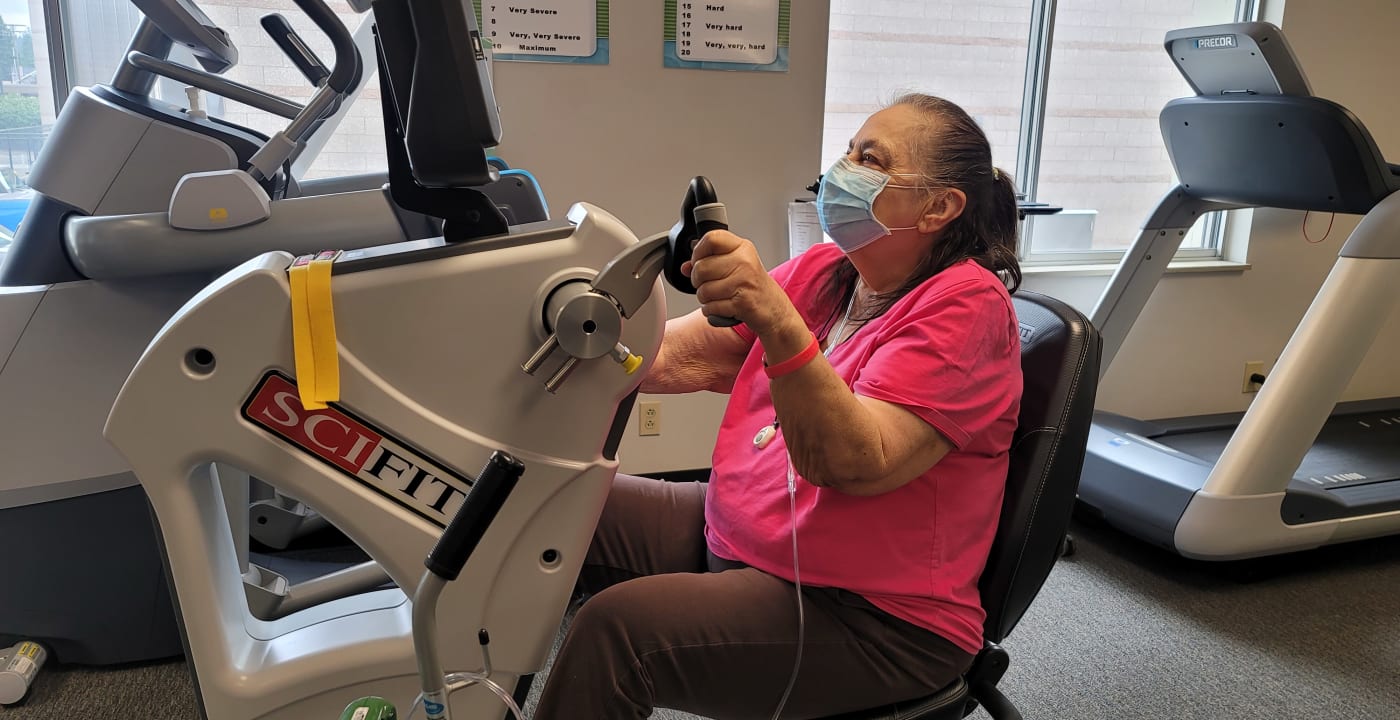Pulmonary rehabilitation improves the quality of life for patients suffering from pulmonary fibrosis

Pulmonary fibrosis. It’s a difficult diagnosis to hear. A lung disease that causes scarring in the lungs that leads to chronic coughs, shortness of breath and fatigue, pulmonary fibrosis is incurable and can be debilitating.
But with respiratory rehabilitation, patients can often regain quality of life and get back to doing things they love, says Karen Edwards, pulmonary rehabilitation coordinator with Pulse Heart Institute’s Pulmonary Rehabilitation Program at MultiCare Auburn Medical Center.
While most people are familiar with the notion of physical rehabilitation, Edwards says pulmonary rehabilitation is specifically tailored to managing chronic lung disease, including pulmonary fibrosis.
During pulmonary rehabilitation, patients can exercise with continuous flow oxygen if needed, Edwards says. When beginning the program, that’s often the case.
“They usually are reconditioned and it’s very difficult to do basic daily activities that most of us take for granted,” she says. “It can be overwhelming to walk up a flight of stairs.”
Therapists monitor to ensure that any oxygen systems the patient uses at home are adequate to maintain a healthy exercise program.
“As patients progress, they may need more, less or just a different system,” she says.
If the home oxygen system isn’t right, the therapists work with physicians to find the best system so patients can exercise at home.
“We do a six-minute walk test initially,” she says, “Then mid-program and at the end with their home system to make sure it adequately meets their oxygenation needs.”
In addition to using oxygen to help pulmonary fibrosis patients tolerate exercise, pulmonary rehabilitation includes learning breathing techniques like pursed lip breathing and belly breathing to help manage shortness of breath.
“COVID-19 has brought unique challenges,” Edwards says.
In addition to increasing patient loads because COVID-19 can lead to pulmonary fibrosis, masks make it difficult to teach some breathing techniques. So, the team is using a video series to educate patients in how to take better care of themselves.
Typically, pulmonary rehabilitation involves two to three visits per week for three to four months. Edwards cautions patients that it’s not a quick fix.
“It took several months, often years, to get to the point where they’re at right now,” she says. “They can’t expect a reversal or maintenance immediately.”
While progress can be measured in oxygenation levels and exercise intensity and endurance during rehab, for Edwards, real success is defined by what happens in real life.
She describes patients who’ve had to give up activities they love, like fishing and golfing, who are able to return to those activities after a few months of rehabilitation helps to build up their stamina and manage their symptoms. Or patients with terminal diagnoses who are able to make the most of the time they have left because rehabilitation has made them stronger.
“Pulmonary rehabilitation helps patients set — and achieve — goals that they didn’t think was possible,” says Edwards. “They can work, they can socialize. They can return to hobbies they may have thought they’d have to give up forever.”
Currently the Pulmonary Rehabilitation Program is available at Auburn Medical Center and Tacoma General Hospital in the South Puget Sound and at Deaconess and Valley Hospitals in Spokane. Edwards says she hopes to offer pulmonary rehabilitation services at Good Samaritan Hospital in Puyallup soon.
With COVID-19 resulting in so many patients recovering from serious lung infections, the current wait list for services is likely to continue to grow. But Edwards says it’s worth the wait for most patients.
“The only people that don’t improve,” she says, “Are the ones that don’t come.”
Learn more about Pulse Heart Institute’s Pulmonary Rehabilitation Program.




